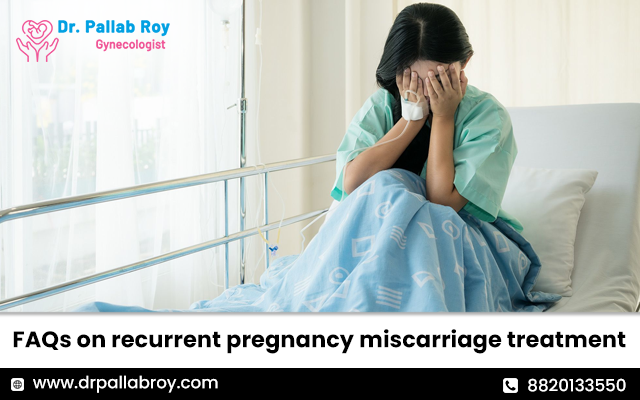Experiencing recurrent pregnancy miscarriage can be incredibly distressing for couples hoping to start or expand their families. Understanding the causes and treatments available can provide hope and clarity. Here are some frequently asked questions about the treatment of recurrent pregnancy miscarriage. Find their answers from the best normal delivery doctor in Behala.
What are the common causes of recurrent pregnancy miscarriage?
Recurrent pregnancy miscarriage can result from a variety of factors, including:
- Genetic Factors: Chromosomal abnormalities in the embryo, often due to genetic issues with the parents, can lead to recurrent losses.
- Anatomical Issues: Uterine abnormalities like fibroids or uterine adhesions can interfere with embryo implantation and development.
- Endocrine Disorders: Conditions such as thyroid dysfunction, uncontrolled diabetes and polycystic ovary syndrome (PCOS) can affect pregnancy viability.
- Immune System Issues: Autoimmune disorders can cause the body to mistakenly attack the embryo.
- Infections: Certain infections can lead to miscarriages, although they are less commonly a cause of recurrent pregnancy loss.
- Lifestyle Factors: Smoking, excessive alcohol consumption and obesity can result in recurrent miscarriages.
How is Recurrent Pregnancy Miscarriage Diagnosed?
As per a doctor specializing in recurrent miscarriage treatment in Behala, diagnosis involves a thorough evaluation, including:
- Medical History Review: Analyzing the patient’s medical, reproductive and family history.
- Genetic Testing: Evaluating both parents to identify chromosomal abnormalities.
- Imaging Tests: Ultrasound, hysterosalpingography or MRI to detect uterine abnormalities.
- Blood Tests: Checking for endocrine disorders, autoimmune disorders and infections.
- Hormonal Evaluation: Assessing thyroid function, ovarian reserve and other relevant hormones.
What treatments are available for recurrent pregnancy loss?
According to the best gynecologist doctor in Behala, the treatment depends on the identified cause:
- Genetic Counseling and Testing: Preimplantation genetic testing (PGT) during in vitro fertilization (IVF) can help select embryos without chromosomal abnormalities.
- Surgical Interventions: Corrective surgery for uterine anomalies, such as septum resection or fibroid removal, can improve pregnancy outcomes.
- Hormonal Treatments: Managing thyroid dysfunction or supplementing with progesterone can support early pregnancy.
- Lifestyle Modifications: Weight management, smoking cessation and stopping alcohol intake can improve pregnancy success rates.
Are there supportive treatments to enhance pregnancy success?
Yes, supportive measures can help maintain a healthy pregnancy:
- Prenatal Vitamins: Taking folic acid and other prenatal vitamins can reduce the risk of neural tube defects and support overall pregnancy health.
- Regular Monitoring: Frequent ultrasounds and check-ups can help detect and address any issues early.
When should I seek medical help for recurrent pregnancy loss?
If you experience two or more consecutive miscarriages, it is advisable to seek medical advice. Early evaluation and intervention can help identify the cause and improve the likelihood of a successful pregnancy in the future.
Conclusion
If you are struggling with recurrent pregnancy loss, consult the best normal delivery doctor in Behala to explore your options and develop a proper treatment plan.

